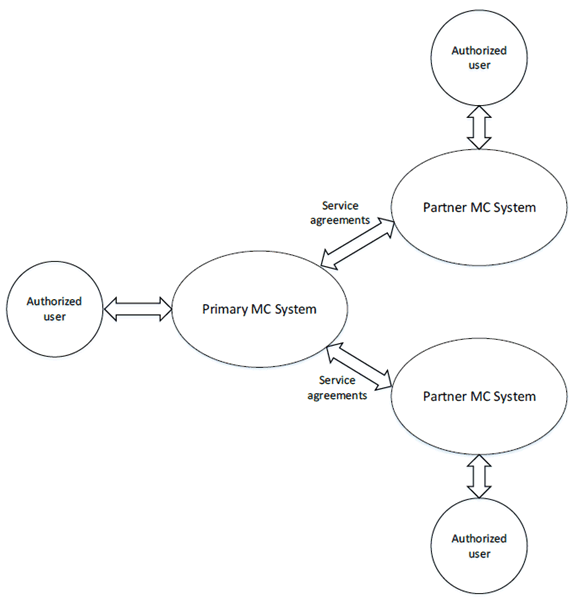Content for TR 23.700-38 Word version: 18.0.0
1 Scope
2 References
3 Definitions of terms, symbols and abbreviations
4 Scenarios
4.1 General
4.2 Relationship between MC systems
...
...
1 Scope p. 8
The present document studies sharing of administrative configuration between interconnected MC service systems, based on stage 1 requirements specified in TS 22.280.
This study investigates related use cases and identifies solutions to support exchange administrative configuration, security relevant data and information between interconnected MC service systems.
2 References p. 8
The following documents contain provisions which, through reference in this text, constitute provisions of the present document.
- References are either specific (identified by date of publication, edition number, version number, etc.) or non-specific.
- For a specific reference, subsequent revisions do not apply.
- For a non-specific reference, the latest version applies. In the case of a reference to a 3GPP document (including a GSM document), a non-specific reference implicitly refers to the latest version of that document in the same Release as the present document.
[1]
TR 21.905: "Vocabulary for 3GPP Specifications".
[2]
TS 22.280: "Mission Critical Services Common Requirements (MCCoRe); Stage 1".
[3]
TR 22.881: "Study on sharing administrative configuration information between interconnected Mission Critical (MCX) service systems".
[4]
TS 33.180: "Security of the Mission Critical (MC) service".
[5]
TS 23.280: "Common functional architecture to support mission critical services; Stage 2".
3 Definitions of terms, symbols and abbreviations p. 8
3.1 Terms p. 8
For the purposes of the present document, the terms given in TR 21.905 and the following apply. A term defined in the present document takes precedence over the definition of the same term, if any, in TR 21.905.
Administrative Configuration Management eXchange (ACMX):
A term that describes the exchange of administrative configuration management information (e.g. MC service user profile, group management configuration, system parameters) between interconnected MC systems.
Primary ACMC:
Administrative Configuration Management Client of an MC service user that is homed to the primary MC system.
Primary ACMS:
Administrative Configuration Management Server of the primary MC system.
Partner ACMC:
Administrative Configuration Management Client of an MC service user that is homed to partner MC system(s).
Partner ACMS:
Administrative Configuration Management Server of the partner MC system.
3.2 Symbols p. 9
For the purposes of the present document, the following symbols apply:
3.3 Abbreviations p. 9
For the purposes of the present document, the abbreviations given in TR 21.905 and the following apply. An abbreviation defined in the present document takes precedence over the definition of the same abbreviation, if any, in TR 21.905.
ACMX
Administrative Configuration Management eXchange.
ACMC
Administrative Configuration Management Client
ACMS
Administrative Configuration Management Server
4 Scenarios p. 9
4.1 General p. 9
3GPP TR 22.881 identified some use cases under which the administrative configurations exchange between interconnected MC systems (2 or more MC systems) would typically take place. This will help to identify and specify the solutions aspects in this study, in order to serve these use cases properly.
4.2 Relationship between MC systems p. 9
Figure 4.2-1 describes the relationship between the interconnected MC systems involved in exchanging the administrative configurations.

An authorized user can trigger the exchange of administrative configurations or/and information with one or more interconnected partner MC system at the same time, which should be regulated through the service agreements with the partner MC systems. The interconnected partner MC systems shall have service agreements to the primary MC system, this is mandatory for this setup. The MC partner systems could potentially have service agreement between them, but this is not relevant for this study.
Processing the configuration data might require the involvement of an authorized user (manually or automatically), who can decide whether to accept, modify or reject the configuration data.